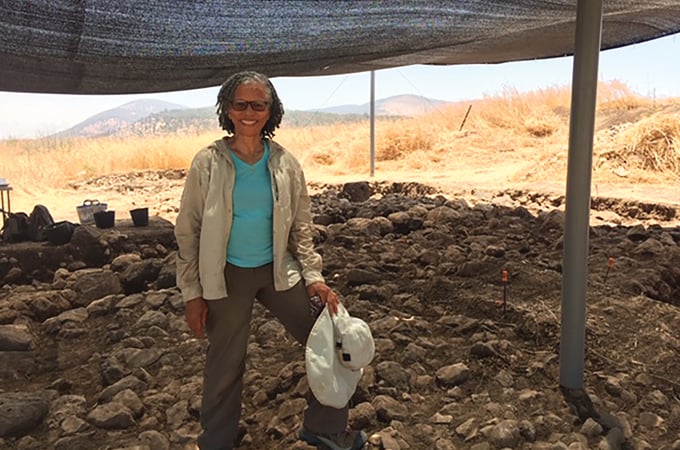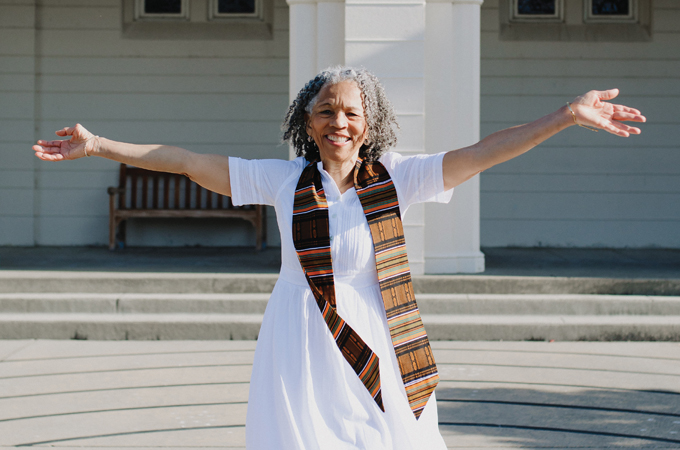When Denise Diaab ’19 (M.Div.) was offered the opportunity to travel to Israel with one of her San Francisco Theological Seminary (SFTS) professors, she didn’t hesitate.
“A voice in my head said, ‘Ya gotta go,’” she recalls.
Diaab joined Rev. Yolanda Norton, professor of Hebrew Bible/H. Eugene Farlough Professor of Black Church Studies at SFTS (now part of U of R’s new Graduate School of Theology), for the two-week trip.
“I had already taken a class from Professor Norton and learned a lot, so I knew I would be studying things on this trip that I wouldn’t encounter any place else,” says Diaab. “And having the opportunity to return to Israel and swim in the Dead Sea—something I regretted missing on my first visit in 2010—seemed redemptive.”
The trip did not disappoint. It spanned an archaeological dig in the Jezreel Valley (a large fertile plain in Israel’s Northern district), living on a kibbutz, staying in a hotel owned by Palestinian Christians, and talking openly with people they encountered along the way.
“Professor Norton made certain we were fully prepared,” says Diaab. “She delivered three lectures prior to the trip to lay groundwork; prepped us for excavation work by leading demonstrations in the seminary gardens; and assigned readings, papers, and a final project that opened my eyes on ways to interpret the Bible based on archaeological findings. It was an amazing experience.”
Having led numerous trips to Israel and Palestine, Norton has seen how the experience can change people. “Broadly, international travel in any kind of education, especially theology, helps remind our students that their stance—to text, ministry, social justice—is limited,” Norton says. “Global encounters remind us of how limited our perspective is.”

For the trip to Israel in particular, Norton asked students to wrestle with the question: What do we mean when we say “Holy Land”? She notes, “I wanted to encourage people to question what they consider sacred. I didn’t want them to disavow it, just to live in tension with what is sacred for others.”
Working at the archaeological site was a lot like deepening her theological understanding, according to Diaab: “On a dig, you’re gently removing soil layer by layer, going ever deeper, which is similar to the experience one has in seminary when you’re uncovering aspects of God and learning to think theistically. Both experiences take time—you simply can’t rush.”
Diaab is grateful for the range of her experiences at SFTS. A former regulatory project manager for public utilities companies Southern California Edison and SoCalGas, she retired in 2009 to care for her grandson. Unexpectedly, one day in 2015, she felt called to pursue a master’s in divinity. “It was an answer to a question that I didn’t know was on the table,” she says.
Since completing the degree in May, she has engaged in clinical pastoral education at St. Joseph’s Hospital in Orange, spent time with her 91-year-old mother, and begun babysitting a new grandson. In the months ahead, she will complete her ordination exams in preparation for becoming a Presbyterian minister.
The Los Angeles native will undoubtedly continue to travel as well. She has already spent time in Greece and Germany and hiked the 500-mile El Camino de Santiago pilgrimage trail in Spain. “I find international travel eye-opening,” she asserts. “Here in the U.S., we view ourselves as superior and more technologically advanced than any other country, but that’s simply not true.”
When traveling in Germany, for instance, Diaab encountered tech conveniences not currently available in the U.S. as well as unexpectedly warm treatment from residents. “As an African American, I was worried I might not be welcome in the country, but everyone I encountered was friendly and kind—I was even mistaken for a native several times. It made me realize we’re all just people.”
“Studying abroad allows one to understand how much we have here in the States but also to appreciate how many ways there are to live,” Diaab continues. “There’s a generosity of spirit across the world, and it’s tremendously important we experience that by meeting one another as human beings.”






